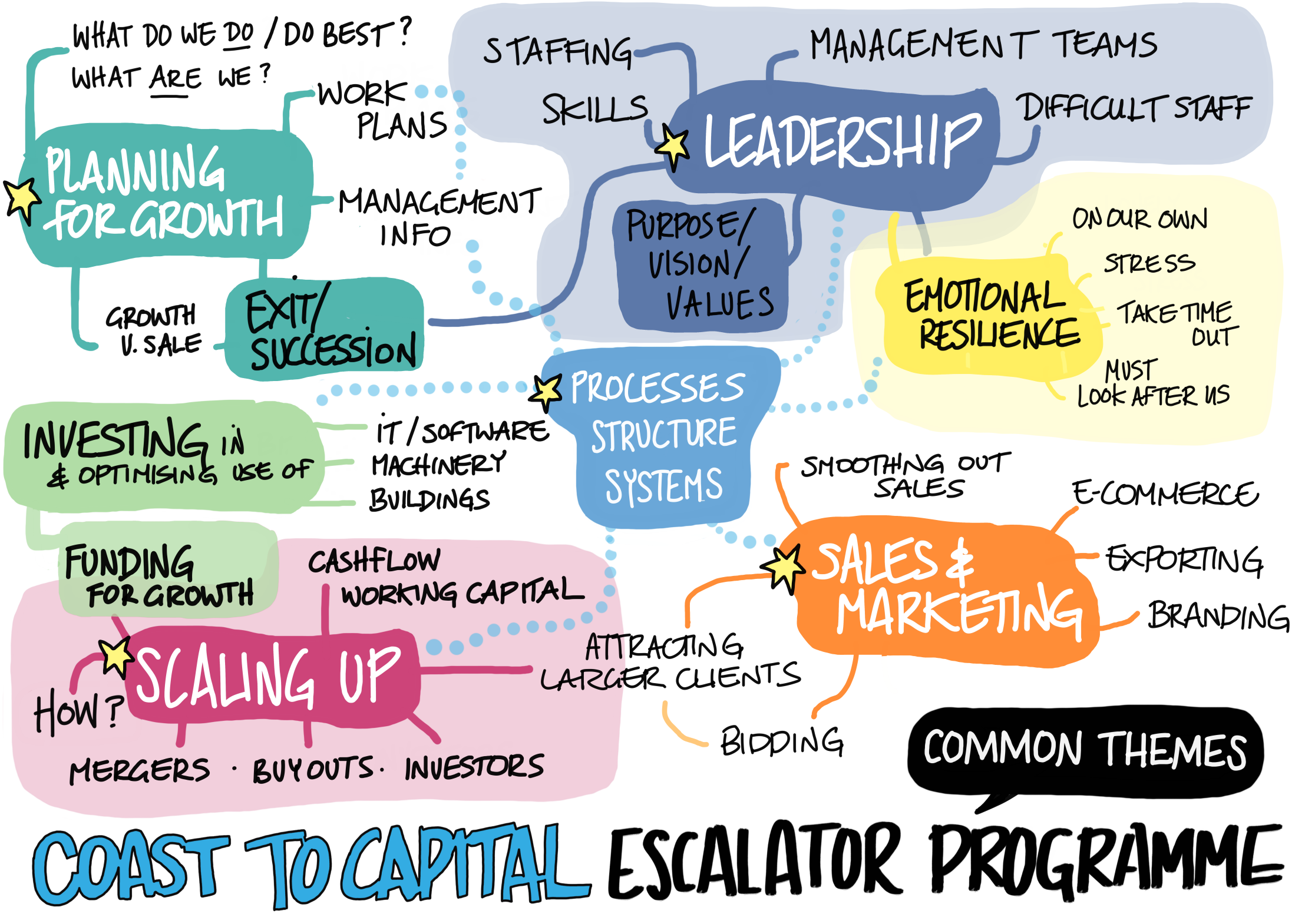Explore the ScaleUp Annual Review 2020
Select a section to expand and explore this year's review..
CONTENTS

Introduction 2020

Chapter 1 2020
The Scaleup business landscape

Chapter 2 2020
Leading Programmes Breaking Down the Barriers for Scaleups

Chapter 3 2020
The local scaleup ecosystem

Chapter 4 2020
Shaping policy to foster UK scaleups: Breaking down barriers

Chapter 5 2020
Looking Forward

Scaleup Stories 2020

Annexes 2020

Coast to Capital
Mobilising the scaleup ecosystem
DATA

34 scaleups

Ave increase in revenue 23.6%

Accessing finance between: £50,000 - £200,000

14 new jobs created

7 businesses now exporting
Participating sectors














BACKGROUND
Coast to Capital LEP is driving forward its ambition to be the most dynamic non-city region in England positioning scaleups centrally in its growth plan. In October 2018 following the DEG course earlier in May, the C2C Growth Hub launched its new scaleup programme to more than 150 stakeholders. Working with this strong ecosystem and its dedicated account relationship management team, the Growth Hub identified potential scaleup businesses and approached them to join the six-month pilot.
MD Hub Ltd – a leading peer-to-peer business growth network for managing directors based in the South of England – was selected to work closely with C2C to deliver the programme. The network was chosen on the strength of its regional knowledge and the scaling expertise of its team of facilitators who work closely with CEOs, executive and founders to achieve sustainable growth.
All facilitators are business professionals with extensive knowledge of the scaleup skills required to grow a business having run their own businesses. They have brought specific disciplines to the task ranging from Finance, Business Strategy, Executive Coaching, Marketing and Social Enterprise.
ONS data for 2017 shows that there are 1,020 scaleups in the Coast to Capital LEP: 360 are classified as scaleups due to rapid growth in their employees, 860 are classified as scaleups due to rapid growth in their turnover and 200 are scaleups that are increasing both employment and turnover simultaneously.
The ONS data reflects that across the four-year period from 2014 to 2017 the density of scaleups has increased by 3.80 per 100,000 of population per year, which is below the median of +3.90 per 100,000 of population.
Running a medium-sized business comes with unique challenges, and it’s been liberating to be able to share experiences and knowledge with people in a similar position. Every meeting throws up constructive ideas on how we can improve our companies and for me personally, it’s already led to some positive changes for my business.
Jack Bedell-Pearce, MD at 4D
SCALEUP PROGRAMMES
The Coast to Capital programme has been designed to offer dedicated support to scaleup business owners and decision makers.
A total of 34 companies were offered a place on the programme after 42 applications were screened against C2C criteria. Applicants’ turnover had to be between £1m and £20m and they had to employ 10 or more staff. In addition they had to demonstrate an average growth of 20% per annum over a three-year period plus a growth mindset and ‘can do’ attitude, which was deemed critical to the success of the cohorts.
Five cohorts were carefully created to ensure the best possible match for growth stage and company size and the groups met once a month for six months. The following graphic was created after the first cohort meetings to represent all the common barriers to growth and issues of concern shared by the scaleups.
Alongside the regular facilitated monthly meetings, subject experts were used as specific needs were identified by the cohorts and extra workshops created around common barriers to growth such as the current funding landscape, raising finance and preparing a business for sale.
Members were also offered several diagnostic tools used by C2C and appointed an Account Manager to share the results along with some free expert interventions. The Escalator programme has been so successful 75% of the members have elected to stay on for an Alumni extension of the peer-to-peer method.
The Escalator Programme provides a supportive peer network and an invaluable facilitated sounding board – each of us is committed to helping others in our cohort to drive growth in their amazing businesses through the different skills and experiences we can share, while taking the same learnings back to our own business.
Lisa Kerr, COO at Man Bites Dog
IMPACT AND RESULTS SO FAR:
The cohorts have developed strong bonds and relationships with individual cohort members sharing their anxieties, frustrations, barriers and successes in a confidential environment.
The breadth and depth of knowledge, experience and goodwill that peer-to-peer groups can nurture never fails to impress me – especially in environments like this where everyone is prepared to drop their guards and speak with real honesty in order to be supportive to one another.
Rob Day, Facilitator at MDHUB
LESSONS LEARNED
- The facilitation and make-up of the group is critical to success; the cohort needs to have a collaborative and open attitude to maximise the benefit.
- Participants valued the sharing and learning effect from working in groups but would also value some 1 to 1 time with the facilitator. For future cohorts C2C has decided to use a slightly more structured approach based on learnings from the pilot.
FUTURE PLANS
Existing cohort members will be invited to become part of an Escalator Alumni programme, likely to include three facilitated groups meeting for a further six months.
A new round of the Escalator Progamme will be launched later this year with C2C looking to include:
- A women leaders’ cohort
- Pre-scaleup cohort
- An innovation cohort
- A tech-based cohort
LONGITUDINAL ANALYSIS
According to ScaleUp Institute analysis of data received directly from ONS for years 2014-2017, the following picture emerges on the local environment.
Local Authorities located within the Coast to Capital LEP have a moderate density of scaleups, and the trend between 2014 and 2017 reveals that almost all of the local authorities showed an increase in the density of scaleup businesses, and half showed an above median increase in scaleup density.
Scaleups by Density: Moderate
The vertical axis of this matrix shows where local authorities located in this LEP stand compared to the rest of the UK: 7 of the 14 local authorities have an above median density of scaleups measured by employment growth and 8 of the 14 local authorities have an above median density of scaleups measured by turnover growth.
Scaleup Trends Over Time: Moderate
The horizontal axis of this matrix shows whether the density of scaleups has increased or decreased over time relative to the rest of the UK: 8 of the 14 local authorities are below the median in terms of improving the density of scaleups by employment in their community and 9 of the 14 local authorities are below the median for scaleups by turnover.
The ScaleUp Institute will continue to monitor this closely in the coming years to track whether local initiatives move the dial in the right direction for increasing the density of scaleups.
Page URL: https://www.scaleupinstitute.org.uk/articles/coast-to-capital/
CONTENTS

Introduction 2020

Chapter 1 2020
The Scaleup business landscape

Chapter 2 2020
Leading Programmes Breaking Down the Barriers for Scaleups

Chapter 3 2020
The local scaleup ecosystem

Chapter 4 2020
Shaping policy to foster UK scaleups: Breaking down barriers

Chapter 5 2020
Looking Forward

Scaleup Stories 2020

Annexes 2020


 Previous
Previous

Share